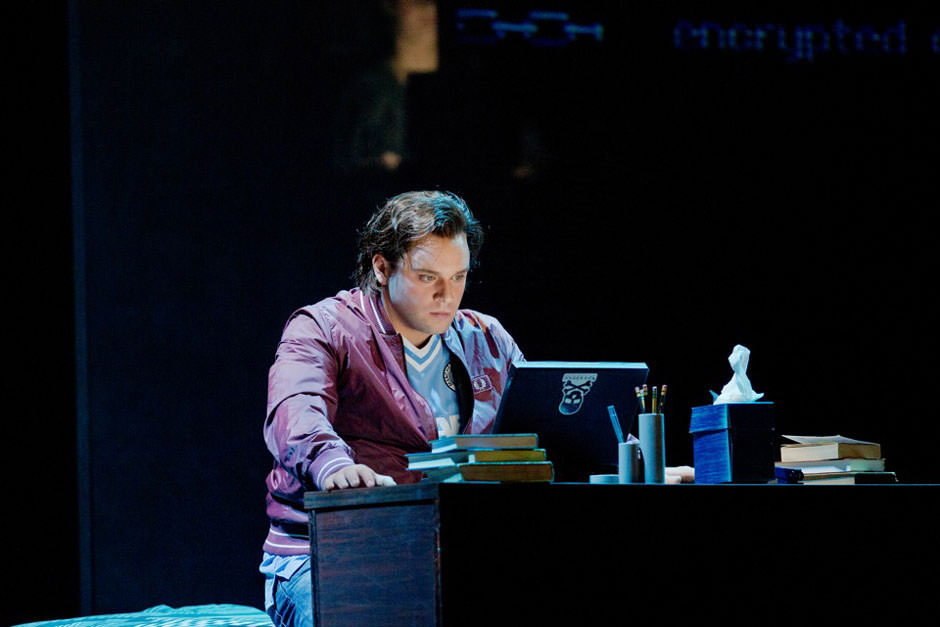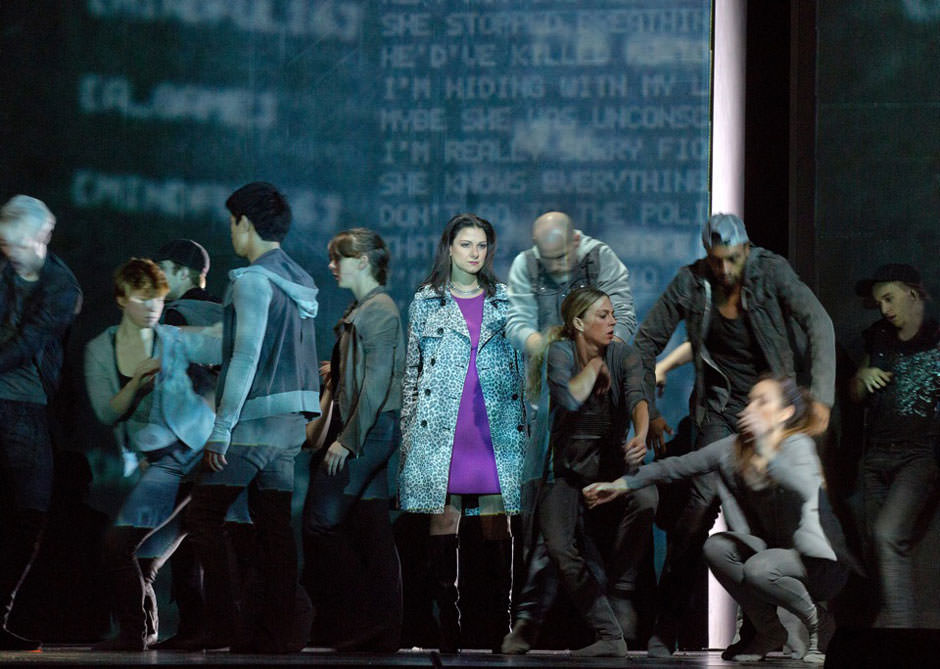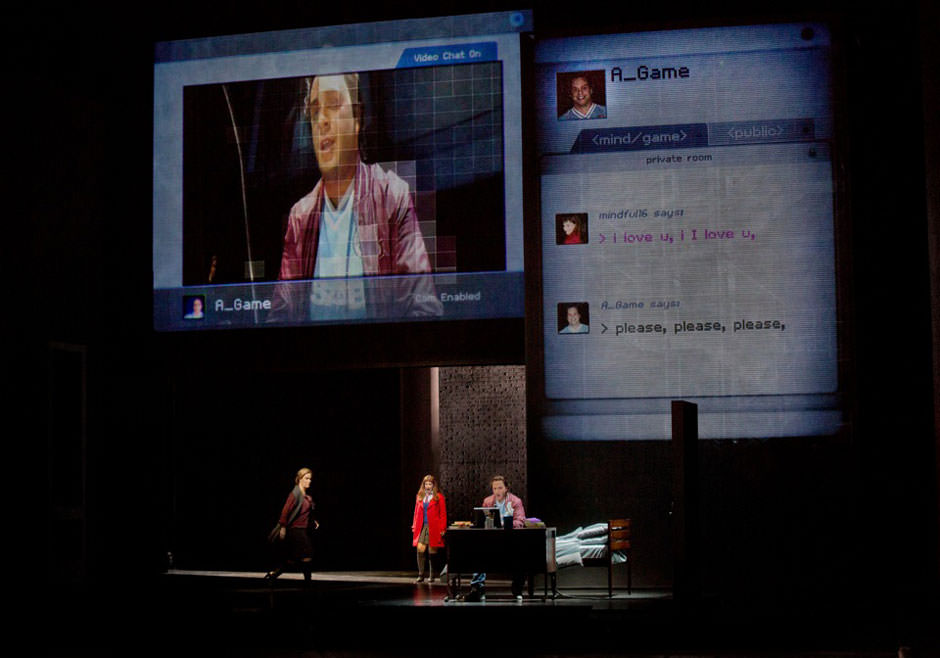While watching the new opera Two Boys at the Met, I experienced something like the divided consciousness of an online multitasker, that curious fusion of total absorption and total distraction. In the floating library of cyberspace, as you read one text you are constantly assailed from the sidelines, or through links embedded in the text itself, by inducements to read others; the more you give yourself over to the virtual world the more you are pulled opposite ways in a wilderness of conflicting signals. This is one of the suggestions of Two Boys, a work composed by Nico Muhly, who was twenty-six when the Met commissioned it in 2007; ostensibly about a crime committed in Manchester, England, in the early 2000s, it unfolds in large part online (the libretto is by the playwright Craig Lucas).
Taking in Two Boys can feel like an exercise in compartmentalized perception. You may find yourself simultaneously following the storyline of a bluntly told police procedural (while putting the music altogether to one side); running your eyes down a series of displayed computer screens (and in doing so tending to blot out everything else going on); tracking, amid the momentary tableaux of a constantly reconfigured set with dozens of video projections, the coming and goings of characters whose degree of actual as opposed to virtual existence is always in doubt (and, while admiring that stagecraft, thinking back irresistibly to earlier eras of symbolist and expressionist theater, as if you might be attending a new show by Gordon Craig or Erwin Piscator), and above (or more properly beneath) all, listening intently to layers of music that overlap, in isolated parallel tracks, without ever quite joining up. Solo voices exchange recitatives; a chorus simulates a sea-surge of lost unidentifiable voices; the orchestra, in a realm of pure oblivious form, executes patterns of mercurial loveliness.
In the end I had the haunting impression of having overheard a great deal of absorbing music pertaining to some other opera existing beyond this one, in a sort of sonic Neverland toward which these lost boys can only faintly reach. At moments I was further distracted by intrusive recollections of the letter scene in Eugene Onegin, performed by Anna Netrebko on the same stage a week earlier. Tatiana, alone at a desk, pouring out her longings in a protracted and endlessly revised letter to Onegin, became an unlikely ancestor of Brian, the sixteen-year-old protagonist of Two Boys, engaging with a succession of ghostly interlocutors in chat rooms. It was interesting to think of Onegin as being partly an opera about media—about translating the act of someone writing words on paper into a musical and dramatic structure that conveys not merely the content of the letter but the desperate energy compelling her to write it and the oppressive solitude in which she does so.
But such a love letter, written in such an era, would already aspire toward aria. It is hard to imagine anything less songlike than the terse and truncated utterances of an anonymous Internet chat room, or indeed of an environment less suggestive of music than the Internet itself. The Net’s openness to an infinity of destinations seems to encourage a mood of disembodiment and isolation, at least as rendered in this opera. (Some future Rossini or Lehár may take a more buoyant tack in charting comical delights and madcap mix-ups in unanticipated online hook-ups.) Two Boys challenges itself to find music in that multiconnected zone of disconnection. The premise here—the inexplicable stabbing of a young boy by a slightly older boy he met online—is altogether grim, an anecdote (apparently, as they say in movies, “based on a true story”) that could almost serve as a cautionary tale for parents wary of their children’s computer use. The parents here are as clueless as they can be, unsurprisingly since we are at the turn of the twenty-first century, that remote period, in an implicitly drab and emotionally worn-out English urban milieu.
The preliminary scrim of blurry surveillance footage sets the glum tone well enough, a tone that is sustained as we watch a melancholy policewoman, Detective Inspector Strawson (Alice Coote), begin her investigation of the stabbing. But the gritty realities of police station and hospital room represent only one layer in Michael Yeargan’s intricately conceived and frequently shifting set design, in which multiple strata are superimposed: the virtual space at center stage where chat-room voices assume physical form; the wide pillars on which fragments of digitized language (among them well-publicized instances of on-line cajolery, stalking, bullying, and children being driven to suicide) stream, coalesce, and break apart into cosmic cloudbursts; the shadowy recesses where a chorus evokes the ocean of ceaseless electronic communication that Brian (Paul Appleby) has plugged into.
Advertisement
It would be unfair to apply the old derogatory joke about Broadway musicals where you walk out humming the sets, but both the production design and Bartlett Sher’s sharply imagined direction do contribute enormously to the effectiveness of Two Boys. There is a commanding visual life to the proceedings, even if the interwoven choreography often seems like gratuitous busyness, a punctuation device to keep things moving, crowding an already crowded stage. The fundamental problem of an opera about the Internet is where it is shown to be taking place—in a room, on a screen, in the mind of the user, in a nano-universe of electron atoms? Represented symbolically onstage, the Net takes on a mythic and dreamlike aura, as a portal to realms where ordinary logic and limitations do not apply. For the unformed, virginal Brian—a character so malleable as to be unknowable, especially to himself—the computer screen is the ritual space where desire and terror materialize in the form of chat-room dialogue.
As we see these texts blown up at the sides of stage (a neat way to incorporate supertitles directly into the work) the same dialogue is sung by Brian and the four apparitions who lead him—by way of a skein of ominous conspiracy, horrific threats and crimes, and disturbing sexual temptation—to the point of stabbing a thirteen-year-old boy he has met only once before. There is a mystery here, spelled out as baldly as a television episode, and its unraveling by Inspector Strawson is the libretto’s through-line. In following it we are also given in broad strokes a glimpse of her own discontented life, of caring for an ailing mother and nursing regrets over the child she gave up for adoption, who is now the same age as Brian: a back story contrived for clear enough dramatic purposes but no less contrived for that.
The inspector’s adult world is without color or satisfaction, a destination that no child in his right mind would want to arrive at. Its music is likewise curt and functional. The grown-ups are scarcely capable of emotional statement, and it is only as Strawson becomes initiated into Brian’s strange and tormented digital world that she begins to express feeling vocally, right up to the final passage in which she seems to be making a direct appeal to the audience to make contact with the pain that has been laid bare. On the inspector falls the burden of clarifying a meaningful reaction to the otherwise bizarre and borderline experiences Brian undergoes at the hands of his shadowy online acquaintances, experiences that range from coercion into webcam masturbation to recruitment to murder on the orders of a seductive secret agent (beautifully sung by Sandra Piques Eddy). Those acquaintances—who emerge in a series of separate numbers, like so many vaudeville acts—are ultimately exposed as the masks, or ventriloquist’s dummies, of a single precocious and troubled mind.
That mind belongs to the only character who does more than react, even if his actions are violently self-destructive. When finally revealed, he is sung by a boy soprano (the very effective Andrew Pulver) whose choir-boy voice cuts through everything else, the sound of a bedeviled innocence sensing its power with a mix of dread and longing. We have heard his voice before early in the opera, at an Anglican service at which both boys are present, the traces of liturgy offering a vestige of an earlier culture that once offered a brick-and-mortar place in which people communed in the presence of something larger than themselves. Nico Muhly’s devotion to English Renaissance choral music—evident in his recorded arrangements of compositions by William Byrd and Orlando Gibbons—is audible here and at other moments in a score that bears traces of influences from Anton Webern to Philip Glass, while giving constant evidence of Muhly’s own gift for texture and timbre.
Oddly, the opera’s least expressive music are the parts sung by individual characters. This is arguably perfectly in keeping with the work’s intentions—all these characters are in one way or another frustrated, repressed, cowed, inarticulate—but the effect is of a lyric impulse deliberately curtailed, blunted, held back. Any vibrant sense of individuality seems to have abandoned this world. Brian, the central figure, is caught somewhere between yearning and despondency, incapable of the brightness of invention as he finds himself subject to the entreaties of phantasmal entities. When asked finally to explain what drove him to act he can only reply: “I don’t know…I don’t know” in a phrase that loops around like a circle with no exit. The much richer music for chorus and orchestra does not simply underscore the main action but provides a hint of something wider and deeper than the constricted catastrophe in the foreground. That chorus might be an interconnecting hive-mind feeling its way toward an as yet undelivered illumination; or perhaps simply the collective sound made by a myriad isolated voices as they pulsate in response to obscure desires and obscure hurts.
Advertisement
Nico Muhly’s Two Boys is being performed at New York’s Metropolitan Opera through November 14.




